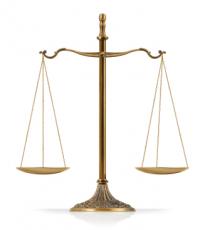Consultation on access to civil justice
Tue 24 May 2022
The consultation is asking for feedback on a strategy for improving access to civil justice in Aotearoa New Zealand.

Consultation on access to civil justice
The Chief Justice and Secretary for Justice have convened a working group to invite feedback on a draft strategic framework called Wayfinding for Civil Justice. The focus of the framework is on improving access to civil justice in Aotearoa New Zealand.
The closing date to give written feedback for the consultation is 30 June 2022.
Civil justice is the system of law used to resolve private disputes. Private disputes include matters such as problems with contracts, disputes in business or about property, and legal arrangements in relation to family matters. Access to civil justice includes issues such as understanding the rights you have in relation to a dispute, the ways that you can take action to deal with a dispute, and finding and using a lawyer. It does not generally refer to justice in relation to outcomes from using civil law.
The consultation overview states that the framework aims to:
- "encourage a unified and coordinated approach to improving access to civil justice
- use the resources the sector has as strategically as possible
- provide clear signals to funders of access to justice mahi (government and non-government) about what work is ongoing, where the gaps are, and where co-ordination can be achieved."
The Wayfinding for Civil Justice consultation is only related to access to civil justice and to civil law.
In Aotearoa New Zealand there are two main streams of law: civil and criminal. The Ministry of Justice describes the difference as "Civil law covers disputes between individuals, companies and sometimes local or central government. It usually doesn't involve the Police." Civil cases can include:
- family proceedings such as care of children, division of shared property and separation proceedings
- protection orders and non-contact orders
- restraining orders for harassment (not from an intimate partner).
Criminal law usually involves the Police investigating a crime.
In situations of family violence and sexual violence, it is possible to have cases in both the civil and criminal justice systems. For example, a person might be involved in a civil case seeking a Protection Order at the same time as the Police are investigating a criminal case for assault.
For more information, see a brief overview from the Community Law Manual about criminal law and family violence or the Ministry of Justice overview of civil law and criminal law.
Update: Following this initial consultation, the working group has published a revised Wayfinding for Civil Justice. The working group welcomes further feedback on this revised document by email to wayfinding@justice.govt.nz. For more information see the consultation information webpage.
Consultation background
The consultation document for the Wayfinding for Civil Justice Strategy states that the goal of the framework is to "...guide the journey towards improved access to justice". It further states:
"There are limited funds available in Aotearoa New Zealand to address its access to justice problems. A national framework is about using what resources we do have as strategically as possible. It is also about providing clear signals to funders of access to justice mahi (government and non-government) about what work is ongoing, where the gaps are, and where co-ordination can be achieved."
It notes that the proposed framework is not a government strategy, stating "This mahi has the support of the government in the form of seed funding, communication support, and enthusiasm, but this is a stakeholder strategy being led by a representative working group."
The draft framework outlines principles to guide the work. It also outlines 7 goals divided into 4 focus areas:
"1. Community knowledge and understanding
1.1 Increase communities’ knowledge to support dispute prevention and early resolution.
1.2 Increase community access to legal information and self-help tools.
2. Legal assistance
2.1 Increase the availability of affordable legal services to help people solve their civil justice problems.
2.2 Increase legal service providers’ knowledge and understanding of communities and their needs.
3. Dispute resolution
3.1 Increase the availability of information about the range of dispute resolution mechanisms available in Aotearoa New Zealand.
3.2 Ensure equitable access to the courts.
4. System knowledge
4.1 Increase knowledge of how the system is currently operating and evaluate and monitor innovation and change."
The consultation asks 8 questions:
"Q1. How necessary do you think a national structure is to ensure the success of Wayfinding for Civil Justice?
Q2. If you consider a national structure is necessary, what form and scale do you think it should take?
Q3. If a national structure extended the work of an existing organisation or body, which organisation or body do you think would be most appropriate?
Q4. How should Te Tiriti o Waitangi be reflected in Wayfinding for Civil Justice? Do you agree with the approach suggested of embedding Te Tiriti o Waitangi into the foundation of Wayfinding for Civil Justice, rather than having it as a separate principle?
Q5. To what extent do you identify with the principles that we have stated to guide the approach to the goals? Do you think they are relevant to your work?
Q6. To what extent do you identify with the goals stated? What other goals do you think should be added?
Q7. Do you feel the current suggested actions in each goal provide your organisation with sufficient guidance?
Q8. Which suggested actions do you think will be particularly relevant to your work?"
You can give feedback on the questions through the online consultation form or by emailing wayfinding@justice.govt.nz.
Feedback is invited from people who work in organisations and in roles where they see the need to improve access to justice. The frequently asked questions (FAQ) for the consultation says that the audience for the consultation includes:
"-institutions and organisations that work in the area of civil justice (including the judiciary, legal professional organisations, government departments, and academics);
-community groups and people supporting those who see or experience barriers to accessing justice (including NGOs, Māori communities, Pacific communities, Asian communities, rural communities, disability communities);
-providers of advice, information, and advocacy, including lawyers and non-lawyer service providers (for example, advocates and McKenzie friends);
-individuals and organisations who are trying to disrupt and/or innovate civil justice;
-funders of work to improve access to justice.
While it is primarily aimed at individuals and organisations whose mahi is about (either directly or indirectly) improving access to justice, the experiences of those who have been directly affected by a struggle to access justice can also inform the shape of this document. We welcome submissions from people with direct experience of the justice system who would like to share their feedback on this draft Wayfinding strategy document."
The draft strategic framework Wayfinding for Civil Justice was developed by a Working Group. The Working Group is chaired by Dr Bridgette Toy-Cronin and also includes Raynor Asher QC, Wi Pere Mita, Gabrielle O’Brien, and Anne Waapu. The Chief Justice Helen Winkelmann and Secretary for Justice Andrew Kibblewhite convened a workshop in March 2020 to discuss how to improve access to civil justice in Aotearoa New Zealand. One outcome from the workshop was to setup this Working Group to guide the development of a national strategic framework to improve access to justice.
This consultation is separate from the Courts of NZ Rules Committee consultation on improving access to civil justice.
The Community Law Centres o Aotearoa submission to the separate consultation by the Rules Committee on improving access to civil justice highlights some issues related to family violence. The Auckland Coalition for the Safety of Women and Children also made a submission to the Rules Committee consultation. However the Rules Committee did not accept the Coalition’s submission because the Committee explained they lacked the capability and competency to address the matters raised by the Coalition.The Coalition's submission was then referred by the Committee to The Chief High Court Judge and the Principal Family Court Judge.
Related news
Budget 2022 includes funding for court and justice initiatives including increases for legal aid, the development of a justice sector-wide strategy for improving outcomes for victims of crime and a number of court initiatives.
In 2021 the NZ Law Society | Te Kāhui Ture o Aotearoa commissioned Colmar Brunton to survey lawyers about access to justice. Nearly 3000 lawyers responded to the survey. The report from the survey, Access to Justice Research 2021 (October 2021), identified significant concerns, with 52% of lawyers rating the legal system as poor or very poor at providing everyone in Aotearoa New Zealand access to justice and 50% of lawyers reporting they had to turn away clients. Tiana Epati, former President of the New Zealand Law Society, said "Vulnerable people who cannot afford lawyers and seek legal aid, are not getting it because the number of lawyers undertaking legal aid has diminished. Legal aid lawyers are unable to cope with demand, are too poorly paid to deal with the complex cases they have, so they quit the legal aid system.”
In March 2022, Chief Justice Helen Winkelmann released her inaugural Annual Report on judicial administration and how the justice system works in Aotearoa New Zealand. It has information on how the judiciary is organised, how the court system works, current challenges and work to improve court processes and to ensure the courts continued to operate during the pandemic. It also includes findings from the October 2021 Judicial diversity survey.
Media outlet NZ Herald has highlighted that Community Law Centres have struggled to fund successful pilots on family law and Kaupapa Māori services. For additional concerns for victim/survivors and their children in Family Court and Oranga Tamariki highlighted by media, see the related media below.
The New Zealand Law Society has commissioned an Independent Review of the statutory framework for legal services in Aotearoa New Zealand to examine the regulation and representation of legal services in Aotearoa New Zealand. The review includes looking at the structure and functions of the Law Society. The Law Society has appointed Professor Ron Paterson as Chair and Jane Meares and Professor Jacinta Ruru as Members of the Independent Review Panel. For more information see the Terms of Reference for the review.
Related media
Legal aid’s Budget boost isn’t enough, Newsroom, 13.06.2022
Family Court defends processes, protection orders, Newsroom, 01.06.2022
Letter from the Minister of Justice, NZ Law Society, 19.05.2022
Legal aid unfixable with money, Waatea News, 18.05.2022
Young Adult List court programme leading the way in justice system transformation, Stuff, 14.05.2022
How a broken system for protection orders fails victims of domestic violence, Newsroom, 10.05.2022
Kiwis deserve a fair deal in court, but civil justice is skewed. That must change, Stuff, 08.05.2022
NZ Law Society calls for urgent funding boost to legal aid system, Stuff, 06.05.2022
OT agrees to Family Court review, Newsroom, 26.04.2022
Family violence court needed nationwide, Waatea News, 16.03.2022
How to change a system that currently fails victim survivors of family violence, RNZ, 04.03.2022
A glimpse of the judicial system; First report into NZ's courts, NZ Herald, 04.03.2022
How the Family Court rewards abusive behaviour rather than recognising it, Newsroom, 02.03.2022
The Family Court’s shocking practice of arresting children, Newsroom, 23.02.2022
Access to justice a concern as backlog grows in district courts, One News, 18.02.2022
Mum abused by ex-husband in Family Court litigation denied police help, Stuff, 15.12.2021
Why can’t all courts be like this?, E-Tangata, 28.11.2021
Our broken legal aid system, RNZ, 18.11.2021
Legal aid crisis a threat to justice, Newsroom, 13.11.2021
Dames say their concerns ignored by top Family Court judge, RNZ, 12.11.2021
Legal aid gap filled by defendants, Waatea News, 12.11.2021
Legal aid: Thousands turned away by lawyers in 'collapsing' system, RNZ, 11.11.2021
Image: Ekaterina Bolovtsova from Pexels











